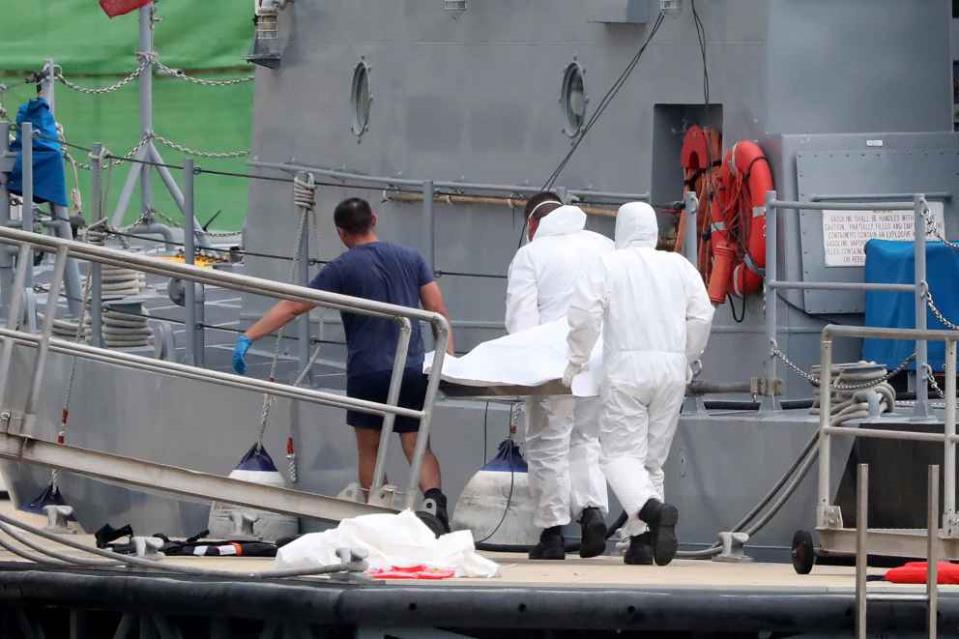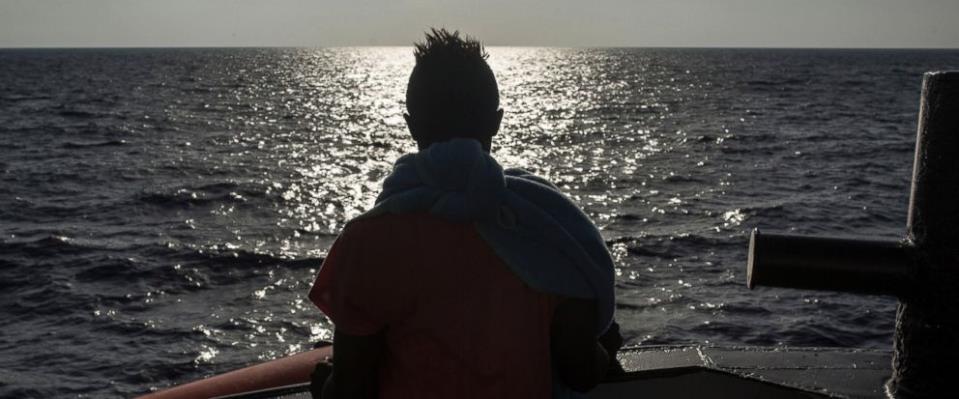A proposal aimed at strengthening the EU Border and Coast Guard (EBCG) is making its way through the European Parliament, and its introduction would help bolster the EU’s border security and could help speed up the return of migrants who do not qualify for protection, PN MEP Roberta Metsola, who has been made the European Parliament’s Rapporteur on this piece of legislation, told The Malta Independent.
The legislation was proposed by the European Commission, and it is now being debated in the European Parliament. PN MEP Roberta Metsola is putting forward the amendments she believes should be included, while also taking stock of what other MEPs want included in order to find a way to push the legislation through. The EU hopes that the legislation is passed prior to the upcoming elections.
What this proposal does, she told The Malta Independent during an interview, is give the necessary flexibility for people to be deployed in a border area under pressure.
The draft proposal reads that the establishment of the EBCG in 2016 has led to significant progress being achieved in the past two years. “However, the reliance on voluntary Member State contributions of staff and equipment has resulted in persistent gaps that have affected the efficiency of the Agency’s joint operations. The need for a more effective control of the EU's external borders is clear. The role of the EBCG must be further strengthened through increased resources and an enhanced mandate. Europe needs to be able to effectively manage its external borders, ensure that returns are effected more efficiently and provide for an enhanced security within the Union.”
The Commission proposes a number of changes to the EBCG, in particular by providing the Agency with its own operational arm: a EBCG standing corps of 10.000 operational staff with executive powers for its activities to effectively support Member States.

Why is there a need for this increase in personnel?
The reason that I am the EP’s Rapporteur is because for my political group, the EPP, security is a number one concern. If one looks at what citizens are telling their MEPs in all Member States, their primary concern is security.
This means that we need to deliver on this concern. The European Commission, together with the security forces of all Member States, got together and found that in order to continue to preserve Schengen (free movement between the Member States), they can only do it if there is mutual trust between Member States and the external borders are secured.
There is no hard data which tells us that they are secure. Every Member State is different. For example, the Finnish – Russian border is the strongest in the EU, but the Greek – Turkish border is not strong, and there are no common rules on the sea borders.
The proposal essentially beefs up security personnel, which will not only be Member States’ personnel, but EU personnel, who will be placed at targeted positions. We are talking about a pool of 10,000 personnel, some permanently recruited and some to be seconded in times of crisis, to be placed at the external border when needed.
That means that when deployed, one would know exactly who is coming in and going out, meaning that whenever there is a security concern – which today would result a country deciding to temporarily reintroduce internal borders, might take longer to do so. The temporary reintroduction of internal borders had major economic impacts, with trucks stuck at the borders, of goods being moved and the free movement of persons who live in border locations.

Am I correct in saying that, when it comes to the EU’s Border and Coast Guard, they would not be able to be stationed in a country without that country’s permission?
Yes. That is how it is today.
Are you planning any changes?
There is one slight modification. What happened in 2015, during the Syrian crisis which saw a massive amount of Syrian refugees heading for Greece before the agreement with Turkey, was a realisation that sometimes a frontier member state is overwhelmed. Now there are two scenarios in which the EBCG gets involved– the Member State requesting help, and an assessment by all law enforcement authorities that there is a lacuna in Greece and that something has to be done. What the new proposal does is bridge the two conditions.
In other words, that the Member State which is in trouble – and once one is in trouble it means the whole Schengen area is in trouble – the Member State will be asked to report on its border situation. The EBCG will now be able to take its own initiatives, but only following an agreement with the Member State concerned.

What is the main role of the European Border and Coast Guard?
It used to be solely surveillance in the original mandate. That was changed a few years ago in order to allow for vessels to not only coordinate but if necessary carry out search and rescue operations. Over the years, Member States have had to beef up the Agency’s operations. Maritime merchant vessels came to the Agency and had said that they needed to stop doing our job. There were constant efforts with neighbours in North Africa, in order to try and bring them on board in terms of preventing people leaving those countries without breaching the principle of non-refoulement.
This year, the Italian Coast Guard told me that 40,000 returns were carried out by the Libyan Coast Guard. Whereas before the Italian Mare Nostrum operation was closer to the Libyan coast, and thus lower quality boats were collected, the EU Border and Coast Guard operation is further away because of what has happened with the agreement with the Libyan Coast Guard, and investment taking place in Africa. Arrivals have significantly decreased.
The agreement between Turkey and the EU is fragile, and if Turkish leader Erdogan decides that he is not getting what he wants, migrants will start to flow through that route again. In addition, there are two new movements, with people going from Tunisia to Sardinia and Corsica, and through Egypt going through the Eastern border, which means that these could potentially be new hotbeds of arrivals.
The minute that happens, the EU Border and Coast Guard assesses the situation on the border, and will then help to speed up the application process, but ultimately the decision for entry remains with Member States.
As Rapporteur I will insist on retaining full Member State sovereignty which also includes decisions on whether these non-sovereign state border and coast guards can carry arms.

How will the 10,000 personnel be divided ?
They will be divided into different categories. The permanent staff will be based in Warsaw where the Agency is based but will be deployed in operation at the external borders of the EU. Then there are the second and third categories, consisting of temporary short and long-term seconded people, where people would go to be trained at the agency. I am proposing a fourth category, consisting of 3,000 border guards forming part of the rapid reaction pool, who will be trained personnel who, in times of crisis, will fly in from all Member States. All these together will make up the 10,000 personnel.
One thing that was important for the Maltese government, and I am working with the Maltese armed forces and the police, is for there to be the possibility for a particular force or authority to include the pilots and personnel linked to the equipment sent to the Agency’s operations as part of the quota of personnel allocated to each EU Member State.
Why is this legislative proposal so important?
This is considered to be the most important file for the end of mandate. It includes €11.8bn for the upcoming 7-year funding period that is granted in order to ensure that the EU is considered to be secure.
Nothing is ever fail-safe, but there are proper assessments. There are a number of citizens that leave to Turkey, heading undetected into Syria, coming back through other means, either claiming to be refugees – which means that border control needs to have experts trained in languages, identification experts etc – in order to identify who is genuine and who is not. We have had thousands of nationals born in the EU become radicalised, which is why we had to create legislation for intra-EU exchange of passenger name data.
In order to have a holistic EU migration policy, and to see who is a genuine refugee, we would need to ensure that they are who they say they are. These border and coast guards will help ensure security during times of crisis.
Another issue, which is a politically difficult one, is the issue of returns. For the first time ever, the European Border and Coast Guard will be given additional responsibility, and be able to help with returns. So if the Maltese government needs help returning ten people to Ghana, the Agency would come and aid with the logistical aspect and the paper-work that needs to be done.
The most difficult issue comes in the form of returns from a third country to a fourth. So if Serbia, which is not an EU state, asks for help in returning 100 people to Bangladesh, then the Agency would be able to go and logistically help through the proposed legislative changes.
The reason for this is that the pressure in a neighbouring country will logically move to the EU if not tackled, and it would then be an EU Member State that would need help. This is the most controversial point. To the left of the political spectrum there are questions as to, for example, whether Serbia implements the EU Convention of Human Rights correctly, and whether the Fundamental Rights Agency can be introduced in Serbia, whether the Fundamental Rights Office has the mandate and competence to suggest and guide the Serbian authorities and whether a complaint is reviewable within an EU jurisdiction.
I am moving towards compiling a list of countries we would be able to help. I would do this, for example, with a country that is on the accession to the EU track, but would not do it with Libya. We are looking at the Balkans as a testing grounds for this idea.
In terms of beefing up the Fundamental Rights Office, I met with them and introduced a number of amendments to the Commission’s proposal, granting more financial resources to the office among other things.